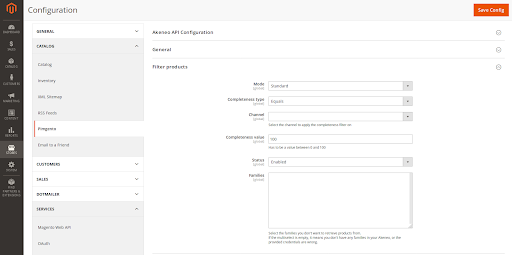
Agence Dn’D is proud to announce the release of the new version of PIMGento 2 in API mode.
Since the development and launch of PIMGento by our teams in 2015, the interest and contributions of numerous developers encouraged us to enhance the connector in order to adapt to the evolutions of Akeneo and Magento. Anxious to provide a module that responded to the market’s needs, our teams launched PIMGento 2, enabling e-merchants to connect their Akeneo PIM to Magento 2. Once more, in an evolving perspective, our teams developed PIMGento 2 API.
Discover PIMGento 2 API’s features!
The new PIMGento 2 API extension
Following the increasing success of PIMGento and PIMGento 2 connectors, we have worked on the development of a new version of our connectors, more flexible, faster and above all, based on the use of Akeneo‘s API instead of flat files.
The connector aims to be easier to use, to maintain, and benefits from new functionalities in order to adapt to the latest versions of Magento 2 and Akeneo. PIMGento 2 API is compatible with Akeneo CE/EE 2.0 and higher versions and Magento 2 CE/EE 2.1.x and higher versions.
The principle of the connector stays the same : quickly, easily and freely import products from Akeneo into Magento 2 shop.
The CSV version of PIMGento 2 connector will not be maintained anymore in 2019. Do not hesitate to consult our PIMGento 2 API migration guide.
The development of the API version of the PIMGento module for Magento 1 is in progress and is likely to be released in November.
Why use API ?
What are the main benefits of using API instead of transfering flat files?
- Avoids setting up automatic or manual file transfer between Akeneo and Magento 2
- Doesn’t require triggering export tasks on Akeneo’s side
- Increases imports speed
- Greater flexibility with regular updates from Akeneo and Magento
- Simplified use and customization
- The management and configuration of the imports are centralized in the Magento 2 back office
PIMGento 2 API : How does it work?
On Akeneo’s side: No module installation is required, only the API user configuration is needed.
On Magento 2’s side: PIMGento 2 API module’s installation on the platform is required. Once installed, the Akeneo API user’s configuration allows the link between the two tools.

The configuration of product import rules is done via Magento 2’s back office :
- The « Standard » mode allows to apply easily filters to products thanks to the provided fields in the back-office :

- The module also has an « Advanced » mode that allows you to write your own API filter by following the instructions contained in the Akeneo API documentation.
There are two ways to import your data:
- By launching tasks via the back-office
- By using Command Line
If you wish to acquire the complete configuration process, we invite you to consult PIMGento 2 API module documentation.
Available features with PIMGento 2 API
Here are the different available entities when importing with PIMGento 2 API:
- Categories
- Families
- Attributes
- Attribute options
- Assets (Akeneo >= 2.0)
- Product models (Akeneo >= 2.0)
- Family variants (Akeneo >= 2.0)
- Products
Additional features:
- Logging and task tracking system
- Manual or automatic triggering of imports
Performances with PIMGento 2 API
Here is the result of a benchmark performed under the following conditions:
- Magento Version: 2.2.0
- Server:
- Cloud AWS hosting
- CPU: 2
- RAM: 8GO
- Configuration:
- 1 website and 2 views (French and English)
- Server:
- Akeneo Version: EE 2.3.8
- Server:
- Akeneo Cloud
- Server:
- Catalog:
- 2166 categories
- 67 families
- 477 attributes
- 1401 options
- 50606 products
| Import type | Import time |
| Categories | 234 seconds |
| Families | 37 seconds |
| Attributes | 74 seconds |
| Options | 24 seconds |
| Product Model + Family Variant | 15 seconds |
| Products (without assets) | 1 hour 44 minutes |
To go a little further on importing products, here are the steps in the import process:
| Action | Time |
| Products fetching via API | 47 minutes |
| Creation of products in Magento | 27 minutes |
| URL rewrites creation | 25 minutes |
| Index / Cache | 5 minutes |
- Products fetching consists of querying the PIM through its API and storing the data in a temporary Magento table. The recovery of 50000 products via API is done at a frequency of 17 products per second.
- The insertion of 50000 products in 27 minutes in Magento represents 30 products per second.
PIMGento 2 API: Demonstration



Interested by PIMGento 2 API?
►A webinar will be held in November.
►Visit Akeneo’s marketplace
►Repository: https://github.com/akeneo/magento2-connector-community

